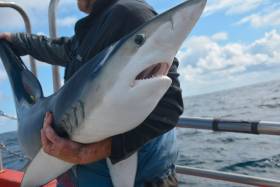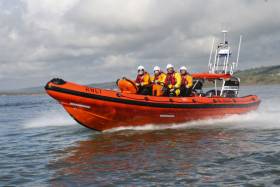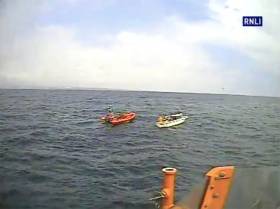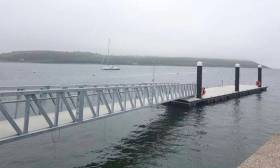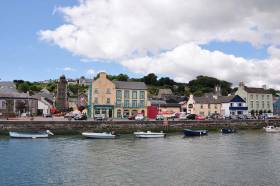Displaying items by tag: East Cork
Youghal RNLI’s lifeboat volunteers in East Cork launched twice over the May Bank Holiday weekend, to join the rescue efforts for a boat aground on rocks and a kayaker in difficulty.
Late on Saturday afternoon (4 May) the crew were requested to launch their Atlantic 85 inshore lifeboat to take part in a multi-agency response following reports of two people aboard a 5m pleasure craft with engine failure that ended up on rocks near Goat Island beach in the Youghal Bay area.
Helmed by Jason Ansbro alongside crew members Jason Innes, Joe O’Connor and Ivan Bryan, the lifeboat arrived on scene shortly before 6pm in favourable weather conditions and a falling tide.
Two lifeboat crew members entered the water and swam ashore to the boat, which was high and dry on the rocks. They observed that the two men onboard, who were both wearing lifejackets, were safe and well and did not require any medial assistance.
It was decided that, due to the position of the boat, the casualties should be airlifted to safety by the Waterford-based Irish Coast Guard helicopter Rescue 117 and handed over to Ardmore Coast Guard, who were waiting close by.
Before leaving the scene, the lifeboat crew secured the casualty boat, which had to be left at the scene.
 Youghal RNLI’s inshore lifeboat approaches the casualty kayaker on the rocks, with another kayaker nearby in the shadow of Sampson Crane in Ardmore Bay on Monday 6 May | Credit: RNLI/Mel Mullane
Youghal RNLI’s inshore lifeboat approaches the casualty kayaker on the rocks, with another kayaker nearby in the shadow of Sampson Crane in Ardmore Bay on Monday 6 May | Credit: RNLI/Mel Mullane
As the long weekend drew to a close on Monday (6 May), the lifeboat was called out at 3.55pm to reports of kayakers in difficulty at Sampson Crane in Ardmore Bay.
The inshore lifeboat, again helmed by Jason Ansbro with crew members Jack Nolan, Jason Innes and John McCarthy, arrived within 10 minutes of launching and one crew member was put into the water to swim to the rocks to assess the casualty, who was standing waiting for assistance.
He did not require any medical attention and was escorted to the lifeboat along with his kayak that had filled with water and capsized.
Weather conditions at the time were fair with a calm sea state and light breeze. Rescue 117 was also in attendance and proceeded to do a sweep of the area to confirm there were no other casualties.
The crew that remained in the lifeboat approached another kayaker who was close by but did not require any assistance. They proceeded to follow the lifeboat to Ardmore Pier where they were handed over to Ardmore Coast Guard awaiting their arrival.
Speaking after the Monday call-out, Youghal RNLI helm Jason Ansbro said: “This was a straightforward shout with a great outcome. With the weather becoming finer it is so important to always have a means of communication within reach at all times.”
A boat with one person on board fishing off Ballycotton Island got into difficulty on Saturday (26 August) when the vessel suffered engine failure and was in danger of running aground on the rocks.
At approximately 2.20pm the skipper of the seven-metre pleasure boat raised the alarm. He had dropped anchor and was trying to fix the engine issue himself. However, due to strong currents the boat was at risk of being pushing onto rocks on the island’s shore.
Ballycotton RNLI’s all-weather lifeboat launched promptly amid good visibility but choppy seas and a north-westerly Force 3-4 wind.
Once on scene, the lifeboat coxswain decided that the safest option was to tow the boat back to the nearest safe and suitable port.
With the towline secured, the crew of the lifeboat were able to return the boat safely to Ballycotton Pier by 3.10pm.
Commenting on the call-out, coxswain Eolan Walsh said: “Thanks to the speedy response of the volunteers, we were able to prevent the situation from deteriorating further. The person was wearing a lifejacket and had called for help as soon as they encountered difficulties.
“We would advise people to take the correct water safety advice for the activity they are taking part in and to always make sure they have a means of raising the alarm if things go wrong.”
Saturday’s call came four days after the Ballycotton lifeboat rescued five people from a rudderless yacht in challenging conditions off the East Cork coast.
Two Men Die During Swim Portion of Ironman Triathlon in East Cork
RTÉ News reports that two men have died in separate incidents during the swimming portion of a triathlon in East Cork on Sunday morning (20 August).
A man in his mid-60s and another man in his mid-40s were both pronounced dead at the scene in Youghal during the Ironman 70.3 event.
In a statement, organisers said: “We share our greatest sympathies with the families and friends of the athletes and will continue to offer them our support as they go through this very difficult time.
"We thank the safety personnel and first responders who worked quickly to provide the athletes with medical assistance.”
It’s understood that the event continued after the incidents with a 90km cycle and long-distance run. More on the story HERE.
Wreck of Ghost Ship MV Alta Has Changed Our Lives for the Worse, East Cork Locals Say
Locals in the area where the ghost ship MV Alta washed ashore nearly three years ago say their lives have been changed for the worse by the wreck’s presence on their doorstep.
Speaking to The Journal for a special feature, the residents of Ballyandreen Bay near Ballycotton in East Cork describe a locale ill prepared for the influx of visitors drawn by the wreck, which washed ashore in February 2020, with their impact including a devastating cliffside fire that threatened local homes.
Other residents have complained of damage to crops and fences that has endangered their livestock, and of alleged looting of farm equipment, impacting severely on their livelihoods
One farmer, Liam Morrison, spoke of the shock of finding “thousands” of people on his field — and the abuse he claims he received from some visitrs.
“We had no problem for many years and I welcome the tourists. They didn’t go across the crops and they didn’t do any damage. But these people [drawn by the MV Alta] had no respect for anything — it changed my attitude towards people,” he said.
The Journal has much more on the story HERE.
Volunteer coastal cleaners in East Cork have gained the support of the joint venture behind a new proposed offshore wind farm project to boost their efforts in tackling the scourge of marine litter on the Irish coast.
As the Irish Examiner reports, Clean Coasts Ballynamona have inked a sponsorship deal with the Inis Ealga Marine Energy Park which will enable them to purchase a boat and other equipment to expand their abilities to clean and protect some 80km of coastline.
Clean Coasts Ballynamon comprise more than 300 volunteers who do regular beach cleans — and also manage 34 acres of coastal habitat to promote biodiversity in East Cork.
The Irish Examiner has more on the story HERE.
A four-day shark festival with a €250,000 prize fund is set to put Ballycotton on the sea angling map later this year.
In his latest Angling Notes for The Irish Times, Derek Evans says the Ballycotton Big Fish from 12-15 September will be the biggest festival of its kind in Europe.
The event is the brainchild of Ballycotton-born Pearse Flynn, an experienced deep-sea angler who was determined to attract the world’s top competitors to an East Cork town already renowned for its big fish records.
Prizes are set to be awarded for biggest shark landed, as well as for the boat that lands the greater number of sharks ever the course of the tournament.
But only big spending anglers need apply, as the entry fee is a whopping €5,000 per head.
The Irish Times has more on the story HERE.
Youghal RNLI To Hold Open Day For New Volunteers In East Cork
#Lifeboats - Youghal RNLI is looking for new volunteer crew members to join its search and rescue service in East Cork.
The lifeboat station will be hosting an open day at the lifeboat station in Youghal this coming Sunday 27 January between 2pm and 5pm where interested candidates can visit to find out more.
Youghal currently has approximately 20 volunteers but is now calling on new volunteers to come forward and find out how they can get involved.
Speaking ahead of the open day, Derry Walsh, Youghal RNLI lifeboat operations manager, said: “We are looking for anyone aged 17 years and over who is willing to offer some of their free time to join the RNLI.
“Every volunteer receives first-class training from the RNLI and learns new skills which can benefit them in many walks of life. Lifeboat crew members need to have a reasonable level of fitness, have good eyesight and not be colour-blind.
“Anyone who would like to volunteer but feels they would not meet the requirements for lifeboat crew should in no way be put off, as shore crew also play an essential role in the launch and recovery of the lifeboat when it goes on service.”
If you cannot make the open day but are still interested in finding out more, contact the station directly or email [email protected].
East Cork Lifeboats Rescue Three From Sinking Vessel
#RNLI - Three men were rescued from their pleasure boat off an East Cork island on Thursday afternoon (26 July) when it began taking on water.
Ballycotton RNLI launched their all-weather lifeboat at around 1.40pm to to the scene east of Capel Island, where the men on board the 26ft pleasure boat had issued a Mayday to the Irish Coast Guard.
Youghal RNLI was also requested to launch their inshore lifeboat, while the coastguard’s Waterford-based helicopter Rescue 117 was also tasked.
Youghal was first on scene and placed two volunteer crew members onboard the boat with a salvage pump. Ballycotton RNLI and its crew arrived shortly after and transferred a larger salvage pump onto the vessel from their all-weather lifeboat.
The three casualties were transferred onto the Youghal lifeboat and brought ashore where they were assisted by Youghal Coast Guard. Ballycotton RNLI took the casualty vessel under tow and brought it ashore.
“This launch had the potential to be extremely serious for the casualties,” said Ballycotton RNLI coxswain Eolan Walsh, “but due to the collaboration with our colleagues at Youghal RNLI and the Irish Coast Guard, we had a safe outcome. We would like to wish the three men involved well following their ordeal.”
Youghal Harbour Pontoon Now Open For Business
Youghal’s long-awaited harbour pontoon is now open for business in what’s expected to be a major boost for the East Cork town.
Mooring fees are €10 per day or €25 a week, applicable to all users — whether casual, commercial or sailing club members.
Preliminary rules for users have been posted on the pontoon, and the necessary key fobs are available from Youghal Town Hall.
There was some confusion last month over the status of the facility, which was installed in early May but without an official opening date, prompting concern among some boaters.
Meanwhile, Youghal’s first full-time harbour master is expected to take up their role next month, as previously reported on Afloat.ie.
New Harbour Master Appointed For Youghal
Youghal in East Cork has been appointed its first full-time Harbour Master.
According to the East Cork Journal, the move is expected to boost Youghal as a destination for boating visitors in tandem with the new harbour pontoon.
Cork County Council advertised for the ‘full time and pensionable’ post last December, as previously reported on Afloat.ie.
The new Harbour Master, who is expected take up their role next month, will also have responsibility for the coastline to nearby Ballycotton.
The appointment comes on the heels of new council bye-laws that give Harbour Masters and proposed ‘harbour constables’ greater authority to deal with mooring fees, abandoned vessels and criminal activity.
Youghal has been the focus of a spate of outboard engine thefts in recent weeks.
The East Cork Journal has more on the story HERE.



























